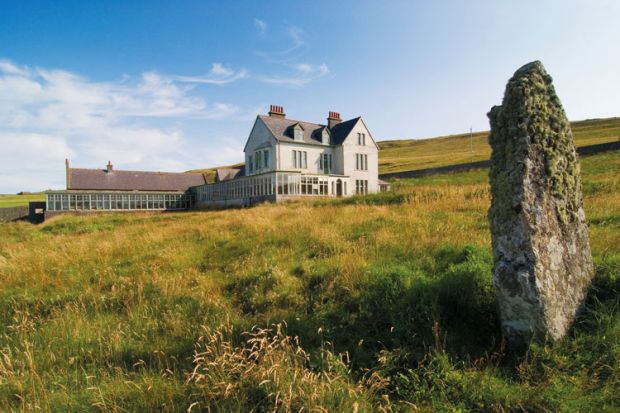Louis Pasteur famously wrote that “chance favours the prepared mind”. Only with a sense of what you’re looking for do you appreciate what’s in front of you. Eureka moments, should they exist, arrive only after sustained thought and understanding. It was the chance discovery in 2000 of a package of old glass lantern slides that did the trick for historian of medicine Jane Coutts. These images suggested to her that there was much potential to write afresh about Sir William Watson Cheyne (1852-1932).
Cheyne (as in “chain”, although we learn that on his native Shetland Isle of Fetlar we would hear “sheen”) was a distinguished surgeon and bacteriologist. He was to Lord Lister, that pioneer of antiseptic surgery, what Thomas Henry Huxley was to Charles Darwin, although it is fair to say that Lister was rather more out in the world than Darwin. Coutts curated an award-winning exhibition on Fetlar about Cheyne’s life, and it was there that one of his descendants drew her attention to the slides found at Leagarth House (pictured above), the Cheyne family home that he built on the island. Once digitised, the faded and worn slides revealed the logistical horrors of military doctoring during the Boer War.
Coutts was already committed to exploring the importance of Fetlar for Cheyne, but these vivid images stimulated a more general search for the sense of place in his life. It is this careful locating of the man and the meticulous concern with how place creates identity that makes her book rich and distinctive. Thus in dealing with Cheyne as Lister’s houseman, we read of the experiences on the surgical ward of one of his patients, a Fetlar woman whose tuberculous shoulder joint required an operation and an eight-month period of recuperation in Edinburgh. An infected joint would be serious for anyone, but especially so for Margaret Mathewson, who made her contribution to the family’s domestic economy by knitting the famed Shetland woollens.
Tuberculosis reverberates throughout Microbes and the Fetlar Man. Cheyne was an instant publicist for Robert Koch’s tubercle bacillus (Mycobacterium tuberculosis), demonstrating the organism in hospitals and town halls as well as at medical and scientific meetings. He later tested Koch’s tuberculin therapy at the German’s request. Much of his surgical practice and writing focused on ameliorating the ravages of this disease in the bones and joints. There is a more intimate association, too; tuberculosis was in the Cheyne family and would claim the life of his son Basil.
During the Boer War in South Africa, the germs of dirty wounds and typhoid proved the greatest threats, and Cheyne was one of a handful of civilian doctors called on to assist the Royal Army Medical Corps. If his exposé of the terrible conditions there is reminiscent of the role played by The Times in the Crimean War, Cheyne, in contrast, remained calm and balanced.
Medicine and bacteriology were undoubtedly Cheyne’s public life, but Coutts has painted the clinical and scientific details on to a broader canvas, taking in the domestic life of his two marriages, parties at Leagarth and integration of the surgeon into the close life of his beloved island. These are the legacy for Fetlar. We have all enjoyed the benefits of germ theory to which Cheyne contributed, but he and his family touched the islanders in a particularly personal way. Coutts’ biography means that now we can all share in it, too.
Helen Bynum is honorary research associate in the department of anthropology, University College London, and author of Spitting Blood: The History of Tuberculosis (2012).
Microbes and the Fetlar Man: The Life of Sir William Watson Cheyne
By Jane Coutts
Humming Earth, 568pp, £35.00
ISBN 9781846220616
Published 20 August 2015
Register to continue
Why register?
- Registration is free and only takes a moment
- Once registered, you can read 3 articles a month
- Sign up for our newsletter
Subscribe
Or subscribe for unlimited access to:
- Unlimited access to news, views, insights & reviews
- Digital editions
- Digital access to THE’s university and college rankings analysis
Already registered or a current subscriber?




